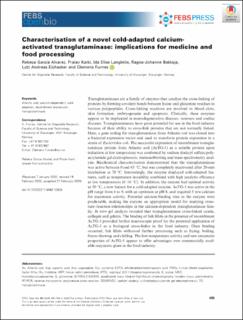| dc.contributor.author | Álvarez, Rebeca García | |
| dc.contributor.author | Karki, Pralav | |
| dc.contributor.author | Langleite, Ida Elise | |
| dc.contributor.author | Bakksjø, Ragna-Johanne | |
| dc.contributor.author | Eichacker, Lutz Andreas | |
| dc.contributor.author | Furnes, Clemens | |
| dc.date.accessioned | 2021-03-03T09:21:35Z | |
| dc.date.available | 2021-03-03T09:21:35Z | |
| dc.date.created | 2020-09-23T13:53:26Z | |
| dc.date.issued | 2020-03 | |
| dc.identifier.citation | Garcia Alvarez, R., Karki, P., Langli, E. et al. (2020) Characterisation of a novel cold-adapted calcium- activated transglutaminase: implications for medicine and food processing. FEBS Open Bio, 10(4), 495-506. | en_US |
| dc.identifier.issn | 2211-5463 | |
| dc.identifier.uri | https://hdl.handle.net/11250/2731324 | |
| dc.description.abstract | Transglutaminases are a family of enzymes that catalyse the cross‐linking of proteins by forming covalent bonds between lysine and glutamine residues in various polypeptides. Cross‐linking reactions are involved in blood clots, skin formation, embryogenesis and apoptosis. Clinically, these enzymes appear to be implicated in neurodegenerative diseases, tumours and coeliac diseases. Transglutaminases have great potential for use in the food industry because of their ability to cross‐link proteins that are not normally linked. Here, a gene coding for transglutaminase from Atlantic cod was cloned into a bacterial expression vector and used to transform protein expression in a strain of Escherichia coli. The successful expression of recombinant transglutaminase protein from Atlantic cod (AcTG‐1) as a soluble protein upon induction at low temperature was confirmed by sodium dodecyl sulfate/polyacrylamide gel electrophoresis, immunoblotting and mass spectrometry analysis. Biochemical characterisation demonstrated that the transglutaminase was active between 0 and 65 °C, but was completely inactivated after 20‐min incubation at 70 °C. Interestingly, the enzyme displayed cold‐adapted features, such as temperature instability combined with high catalytic efficiency at low temperatures (8–16 °C). In addition, the enzyme had optimal activity at 50 °C, a new feature for a cold‐adapted enzyme. AcTG‐1 was active in the pH range from 6 to 9, with an optimum at pH 8, and required 5 mm calcium for maximum activity. Potential calcium‐binding sites in the enzyme were predictable, making the enzyme an appropriate model for studying structure–function relationships in the calcium‐dependent transglutaminase family. In vitro gel analysis revealed that transglutaminase cross‐linked casein, collagen and gelatin. The binding of fish fillets in the presence of recombinant AcTG‐1 provided further macroscopic proof for the potential application of AcTG‐1 as a biological cross‐linker in the food industry. Once binding occurred, fish fillets withstood further processing such as frying, boiling, freeze‐thawing and chilling. The low‐temperature activity and new enzymatic properties of AcTG‐1 appear to offer advantages over commercially available enzymatic glues in the food industry. | en_US |
| dc.language.iso | eng | en_US |
| dc.publisher | FEBS Press and John Wiley & Sons Ltd | en_US |
| dc.rights | Navngivelse 4.0 Internasjonal | * |
| dc.rights.uri | http://creativecommons.org/licenses/by/4.0/deed.no | * |
| dc.title | Characterisation of a novel cold-adapted calcium- activated transglutaminase: implications for medicine and food processing | en_US |
| dc.type | Peer reviewed | en_US |
| dc.type | Journal article | en_US |
| dc.description.version | publishedVersion | en_US |
| dc.rights.holder | © 2020 The Authors. | en_US |
| dc.subject.nsi | VDP::Matematikk og Naturvitenskap: 400::Basale biofag: 470 | en_US |
| dc.source.pagenumber | 495-506 | en_US |
| dc.source.volume | 10 | en_US |
| dc.source.journal | FEBS Open Bio | en_US |
| dc.source.issue | 4 | en_US |
| dc.identifier.doi | 10.1002/2211-5463.12826 | |
| dc.identifier.cristin | 1832586 | |
| dc.relation.project | Universitetet i Stavanger: 8790 | en_US |
| cristin.ispublished | true | |
| cristin.fulltext | original | |
| cristin.qualitycode | 1 | |

